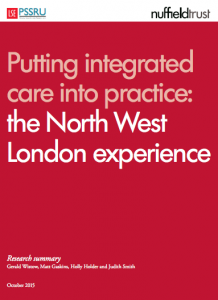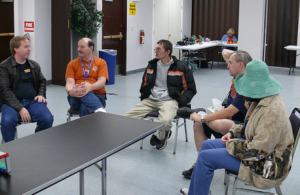
This report from the Nuffield Trust builds on an earlier report evaluating the first year of a programme in North West London (the largest of the 14 integrated care pioneers launched in 2013). It will make interesting reading for commissioners, particularly those involved in New Care Model Vanguards who could benefit from the shared experience and learning from the programme.
Methods

This report shares the findings from an evaluation of the Whole Systems Integrated Care programme in North West London
The evaluation, led by the Nuffield Trust and the London School of Economics and Political Science, assessed a range of factors including: design; engagement; implementation of early adopters; and outcomes.
The evaluation team held interviews, workshops and a focus group alongside analysis of documents, meeting observations and a survey, over a 15 month period. The full research report is available.
Findings
The report shares a number of findings which will resonate with commissioners, including:
- substantial investment in design and planning lay the groundwork for a series of early adopter projects;
- some fading of the clarity around the vision as the programme evolved, with some confusion about how the programme aligned with other initiatives thus highlighting the value of a ‘single narrative for change’;
- a shift from the comprehensive system-wide ambition to in practice, more of a focus on services around the acute-community interface, reflecting national priorities (admissions avoidance) and local enablers;
- a bias towards health service concerns, arising from a predominantly NHS-funded model, suggesting missed opportunities to tackle the prevention agenda and to fully engage with public health;
- clear leadership, governance and management, which helped to champion the change and build credibility;
- involvement of patients, service users and carers added significant value to the design of the programme;
- variable levels of engagement amongst clinicians and frontline staff, suggesting a need to address the key problems which frontline staff face on a day to day basis, to make a difference on the ground;
- the balance of providing support and standardisation whilst allowing local autonomy (for the early adopter projects funded through the programme) is difficult to achieve in practice;
- there are barriers to implementation which can only be addressed at national level, e.g. information governance;
- the need for a different style of leadership to enable collaborative working (system leadership) and the need for more support to develop the associated attributes and behaviours.

Involving service users in change adds value but needs a balance of managing expectations and momentum
The report is a useful addition to an evidence base which is currently varied. It is particularly timely given the emphasis on integration in national and local policy. One of the problems with evaluating change of this nature is that it takes time for systems and behaviours to change. It could be argued it’s still a little early to evaluate a programme intended to improve health and wellbeing – this report explicitly focuses on the design and early progress and whilst there are recommendations for the programme (which are transferable elsewhere), I couldn’t help thinking an additional evaluation a year or two down the line would offer further insights again.

It’s still a little early to evaluate a programme intended to improve health and wellbeing – an additional evaluation a year or two down the line would offer further insights again!
Commentary
The evaluation shares important learning, which will be relevant to other health and social care economies designing and implementing integrated models. Notably, whilst operating at scale offers some efficiencies, there are costs and tensions in the added complexity of, for example, additional governance structures, which should be acknowledged. A key message is the emphasis on system change, acknowledging that a focus on specific interventions or services can risk missing opportunities to effectively address wellbeing and prevention.
Reflecting on how success is measured, particularly in relation to avoiding overly optimistic timeframes and outcomes, there is a recommendation to avoid the temptation to over-promise in the enthusiasm to get stakeholders on board. There is also a balance to be struck in demonstrating some progress to keep patients and communities engaged which could be helped by co-designing more patient-centred outcomes.
For programme teams, the need for continually monitoring the balance of centralisation and localisation is highlighted, noting this will probably need tweaking as the programme develops and to reflect the different needs of operational teams. Formative evaluation can help programme teams to form a view on what’s working well and what isn’t.
Link
Wistow G et al (2015) Putting integrated care into practice: the North West London experience, Nuffield Trust.

My latest blog now up “@CommissionElf: Sharing the learning on integration https://t.co/tdfiYKk6eZ“
What can we learn from NW London’s integrated care programme? https://t.co/kx30YJwu5D
Clear leadership, governance and management critical to implementing integrated care https://t.co/kx30YJwu5D
Involving service users in change adds value but needs a balance of managing
expectations and momentum https://t.co/kx30YJwu5D
Too much focus on specific interventions runs risk of missing opportunities for
more prevention https://t.co/kx30YJwu5D
Too much focus on specific interventions runs risk of missing opportunities for
more prevention https://t.co/2I24P2feBe via @CommissionElf
Formative evaluation important to track progress and learn from successes and
setbacks https://t.co/kx30YJwu5D
Don’t miss: Sharing the learning on integration https://t.co/kx30YJwu5D
[…] 1Sharing the learning on integration – National Elf Service (The Commissioning Elf) […]